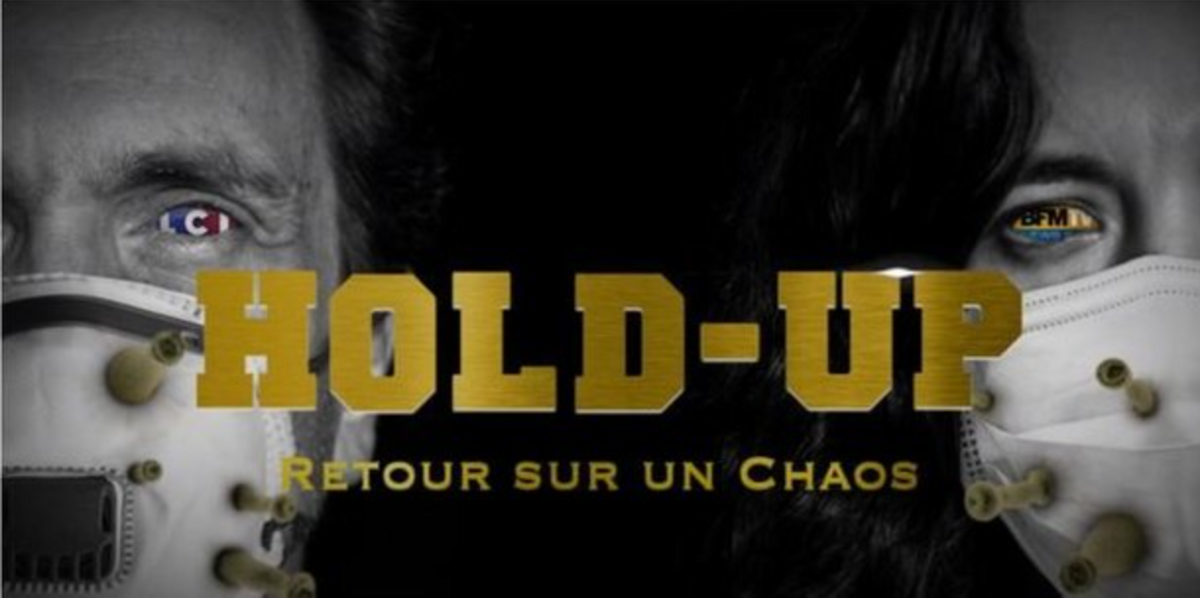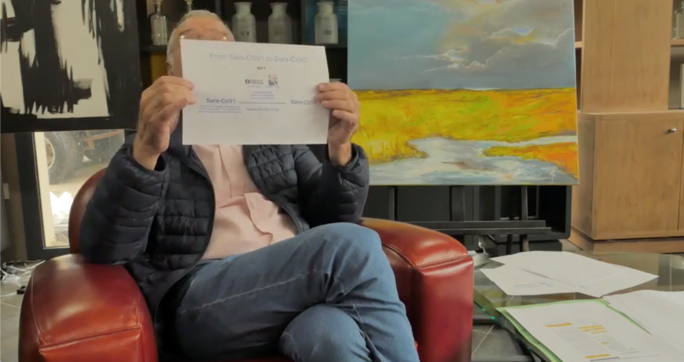Presented as a documentary and available online, Hold-Up is a French film plugging the conspiracy theory that the Covid-19 pandemic was created by powerful individuals to serve their interests, in a "Great Reset" of a mysterious kind.
Superficially, it borrows the features of a journalistic investigation, with a slew of so-called experts, highlighted documents, and a grave-sounding voiceover raising questions that the authorities allegedly do not want asked, all to a background of thriller-like music.
Largely crowd-funded, lasting two hours and 40 minutes and directed by filmmaker and former journalist Pierre Barnérias, it attracted an online audience of three million in the first week following its release on November 11th.
But this sleek production is a parody of a documentary and an example of all that investigative journalism is not; peppered with falsehoods and crude manipulations, claims are made without any corroborating factual evidence, and the film is mostly a one-sided hotchpotch of things implied and mostly by people who have few, if any, credentials to do so.

Enlargement : Illustration 1

It is, for example, obviously dishonest to suggest, by highlighting that the highest number of deaths from Covid-19 in France were recorded during the two-month lockdown on public movement, introduced in mid- March, that this meant that the lockdown itself produced a peak in the death rate. The lockdown was introduced because of the fast-rising spread of the virus, and the incubation period before the disease is declared means that mechanically those cases which subsequently result in deaths will rise after the lockdown.
Contrary to what one so-called ‘expert’ declares in the film, the World Health Organisation (WHO) never called for a ban on post-mortem examinations of patients who died from Covid-19. Rather, the WHO warned of the dangers of contamination in such examinations, and set out safety guidelines which were made available online.
It is also false to declare, as does the commentary in the film, that, before the discovery of the novel coronavirus, a virus that was transmitted to humans from animals had hardly ever been recorded. According to the WHO, along with France’s Pasteur Institute and numerous scientific publications, around 60% of infectious diseases in humans have an animal origin.
Beyond these flagrant untruths, which are so easy to counter-check and discount, Hold-Up is filled with allegations that are backed-up by nothing. In one example, pharmacist Jean-Bernard Fourtillan claims in front of the camera, and without offering the slightest evidence, that the Pasteur Institute created the Covid-19 virus. “They inserted the DNA sequence of malaria” into the H1N1 virus subtype, he announces, referring to a “patent registered in 2003” following research that “began in the 1990s”. Fourtillan brandishes a piece of A4 paper (see image below) on which is written “From Sars COV1 to Sars COV2”, which is followed up by a montage of different documents of various dates, on which some of the texts are highlighted by marker pen in yellow, but where they have been sourced from is never detailed.

Enlargement : Illustration 2

Hold-Up contains far more of the suggested than the boldly proclaimed, pretending to allow the audience to draw its own conclusions from the many supposedly troubling elements presented.
Martine Wonner, a Member of Parliament for President Emmanuel Macron’s ruling LREM party until her exclusion from the movement earlier this year, appears in the film. “I find it important to ask questions, as the film does,” she told Mediapart. “For my part, I permanently hold doubts, and it seems to me that the media should ask itself questions a bit more.”
But rather than questioning, the film’s principal rhetoric is that of things implied, of insinuation. It suggests connections between different events, which are supposedly significant, to imply a logical, causational chain between them, much in the manner of “well, well, well,” as if winking to the audience to fill in the gaps. An example here is the comment that Bill Gates warned of the risk of a pandemic in 2015 and, low and behold, the novel coronavirus comes along just a few years later.
Or another: French news agency AFP reported on a study published by The Lancet casting doubt on the effectiveness of anti-malaria drug hydroxychloroquine in treating Covid-19 (a treatment championed by the anti-establishment French microbiologist Didier Raoult, as well as US President Donald Trump and his Brazilian counterpart Jair Bolsonaro). Hold-Up follows this with the pseudo-revelation that the head of AFP, Fabrice Fries, was a friend of Emmanuel Macron from the time the pair were students of the same academic year at the elite French administration school ENA – and which is a false claim. There had of course been widespread coverage of the paper in The Lancet, but the film attempts to sow a doubt in the minds of its audience that the AFP report was evidence of an elitist plot.
Also appearing in the film is geneticist Alexandra Henrion-Caude. Why, she asks, did the WHO dedicate, in its reports published in the early stages of the pandemic, just two pages of information on the wearing of masks whereas the most recent of these now amounts to 16 pages? “No really, who is being taken for a fool?” she protests. It is not clear what she is implying here, but her incensed tone suggests that whatever it is, it is really very, very grave.
In its attempt to appear as a documentary of serious investigation, Hold-Up presents a number of experts to lend an authoritative veneer, including two Nobel prize-winners and a former French health minister. The first of these to appear is South African-born biophysicist Michael Levitt, awarded the Nobel prize in chemistry in 2013. His comments are in fact quite unremarkable, simply raising the question of whether populations could accept a second introduction of lockdowns. The second to appear is French virologist Luc Montagnier, joint winner of the 2008 Nobel prize in Medicine for his discovery of the human immunodeficiency virus (HIV). His controversial theory, first developed in 2009, that DNA can emit radio waves has seen him largely shunned by the scientific establishment.
As for former French health minister Philippe Douste-Blazy, who in the film speaks out in favour of using hydroxychloroquine to treat Covid-19 patients, he told Mediapart that he had “the feeling of having been manipulated by the director”. He said “it’s clear” that he was used to give authority to Hold-Up. Since he has seen the film he has asked for the sequence in which he appears to be cut out.
Among the so-called specialists there are of course the notorious cranks like Olivier Vuillemin who is described variously as an expert in “scientific fraud” (about which he has published nothing) and later on as an expert in “health metrology”. The sequence in which he rashly draws connections between 5G networks and Covid-19, peppered with jargon in English, is so absurd that it has gone viral on social media.
At the end of Hold-Up is an interview with Nadine Touzeau, a controversial figure who presents herself as a “profiler”, claiming to be able to dress a psychological portrait of individuals by simply studying a photo of them. She gives her opinion of a photo of Laurent Alexandre, a doctor by training and cofounder of Doctissimo, a popular French website that specialises in health issues, with articles, videos and a discussion forum. “This person is extremely false,” concludes Touzeau. “That can be seen by the corners of his mouth and in his way of looking.” That did not appear however to advance the so-called investigation.
Most of those presented as experts, even those who are medical professionals, have no competence in virology or health policies. There are interviews with a gynaecologist, an oncologist, a midwife, but the film pays no attention to the frontline experiences within French hospitals since last March.
“During the lockdown, I was in contact with a gendarme from the brigade for the protection of minors,” says gynaecologist Violaine Guérin. “She was telling me that it is terrifying because there were no complaints filed, no information about what is going on, with people being confined [to their homes], so there were an enormous number of tragedies during this period […].” The voiceover commentary declares: “Complaints of rape were multiplied by three, according to an expert psychiatrist from the brigade for minors”. But the source in question is not identified. Furthermore, an “expert psychiatrist” is not normally the best-placed person to announce statistics on the subject, which are released officially.
Pharmacist Serge Rader, who claims in the film that elderly people in care homes were subjected to euthanasia, says he is certain of this because, “I have observed this, I am a friend of a doctor who looks after three carehomes,” and he adds: “Not only were they not taken into intensive care, but a syringe with Rivotril was prepared for them with an order as well to finish them off.”
Midwife Nathalie Derivaux was interviewed at length, and she also spoke about the decisions made in carehomes, and on the basis of third-hand information. “I have one of my sisters-in-law who works in a retired folks’ home,” she declares. Neither the sister-in-law in question, nor the “friend” of pharmacist Serge Rader were questioned.
The highlight of these interviews of ‘people who spoke to so-and-so and who heard that’ was the case of a man presented as a “former intelligence officer”, whose visual identity is limited to the filming his pullover. He explains that he knows the novel coronavirus was created by humans because he was told so by a manager with France’s Nuclear Safety Agency, the ASN.
Completing this list of authoritative sources are two taxi drivers, who separately criticise the government’s incoherence in its management of the health crisis, and who are not named.
The more the film progresses, the more it loses itself in a whirlwind of questions, the coherence of which is unclear, including: why would the “computer professional” Bill Gates want to vaccinate populations? What is his interest here? How can one explain the concomitance between the development of 5G networks and the pandemic? How is it that in a book about the CIA, prefaced by French historian and journalist Alexandre Adler, a pandemic that originated in China had already been envisaged in 2009?
The effect is to, little-by-little, daze and drown the spectator into asking themselves whether world governments have in fact exaggerated what is simply a case of flu, or that they even put in place a secret plan to kill off a section of the population.
The designated powerful baddies, pulling the strings in secret, include Bill Gates, David Rockefeller and French essayist and former presidential advisor Jacques Attali – who is ironically described as a “prophet” in the film which has a stench of anti-Semitism that likens it to a sort of Protocols of the Elders of Zion 2.0. None of those placed in question are given the opportunity to express themselves, nor is there any interview that offers a contrary point of view.
The last 30 minutes of Hold-Up is made up of a simple theme: those in favour of a world governance, who almost all participate in the Berggruen Institute, invented the pandemic in order to submit humanity to a “great reset”. Thrown into the finale is everything and anything, from cryptocurrency to nanoparticles to 5G. “I am dizzy,” declares the director, “How can people imagine such twisted scenarios?”
Questioned by French online journal France-Soir, which has leant its support to the film from its beginnings, its co-producer Christophe Cossé said he chose to work on the project because the issue of “disinformation” was dear to him. “Around ten years ago I decided to perfect my learning by doing a master’s in psychology and PNL [neuro-linguistic programming] and that’s where I found all the tools for manipulation,” he explained. Enough said.
-------------------------
- The original French version of this article can be found here.
English version by Graham Tearse


